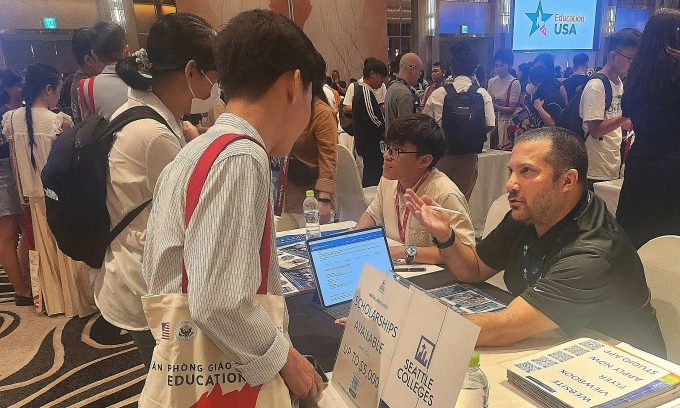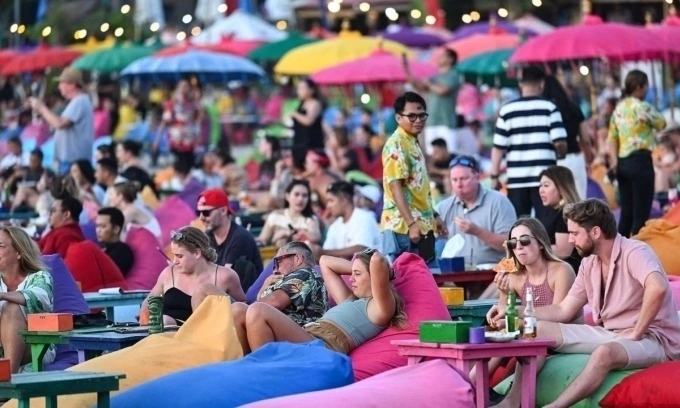Tùy chỉnh
Đọc báo:
Cấp độ:
Nguồn:
Chủ đề:
Tin tức mới nhất trong ngày, cập nhật liên tục 24h. Từ nguồn báo chính thống như CNN, BBC, VOA, Inside Science,...
 2 phút
2 phút Vietnamese students help stabilize enrolments in Australia, Canada, UK, US
A new report shows Vietnam is becoming an increasingly important source of international students for major destinations. In 2024, nearly 40,000 Vietnamese students received study visas for the U.S., Canada, Australia, and the U.K.—a 20% rise compared to five years ago. Over 150,000 Vietnamese students are currently studying abroad, and this number is expected to grow further.
The U.S. remains the top choice, issuing 18,500 visas to Vietnamese students in 2024, a 27% jump from 2023 and 8% above pre‑pandemic levels. Vietnam now ranks sixth among all countries sending students to the U.S., with 63% enrolled in undergraduate programs. ApplyBoard expects continued growth and stable demand in the U.S. market.
Australia has become the third‑largest destination for Vietnamese students, with over 35,000 enrolled in higher education and vocational programs, though upcoming enrolment caps may limit VET visas to around 7,000 in 2025. In Canada, study permits for Vietnamese students grew 16% from 2022 to 2024, with another 14% increase expected in 2025, nearly half for primary and secondary education. The U.K. market remains steady at 2,000–3,500 visas annually, with about 2,100 projected for 2025.
Experts highlight Vietnam's strong academic culture, English proficiency, and growing middle class as key drivers, making it a reliable and high‑potential market for long‑term enrolment growth.
Nguồn: TODAII [ 5566] 2025-07-22 07:33:07
5566] 2025-07-22 07:33:07
 1 phút
1 phút Hotels provide free rooms, meals to families of Ha Long Bay capsized boat victims
After the Vinh Xanh 58 tourist boat capsized in Ha Long Bay on Saturday, killing 35 and leaving four missing, local hotels and restaurants rushed to aid victims' families. The boat, carrying 49 passengers, overturned during a sudden thunderstorm.
T&Y Group co‑founder Dang Van Toan immediately arranged lodging and meals for grieving families and posted a call for support on Facebook, prompting widespread help. Passion Hotel offered free stays and shuttle buses from Hanoi, while the Quang Ninh Tourism Promotion Center reported 22 hotels volunteering free rooms. Many cleared their bookings, mobilized staff, and provided round‑the‑clock service with free meals.
Toan's properties, including The One Palace, Green Suites Hotel, and Green Restaurant, are near Bai Chay Hospital and the port, giving families easy access. He recalled receiving relatives arriving from provinces like Lao Cai and Ha Tinh, even at 3 a.m. His restaurant has been serving about 240 free meals daily to families and injured survivors.
“To stand with the victims and their families during this heartbreaking time is the least we can do,” Toan said, as the community unites to ease their burden while search and rescue efforts continue.
Nguồn: TODAII [ 1650] 2025-07-22 07:32:58
1650] 2025-07-22 07:32:58
 2 phút
2 phút Casino tycoon Stanley Ho's granddaughter Faye Ho seen selling clothes at London market
Faye Ho, granddaughter of late Macau casino tycoon Stanley Ho, surprised many when she was seen selling clothes at a car boot sale in London, dressed casually and smiling as she managed her stall. Her humble activity contrasts sharply with the immense wealth and high-profile legacy of the Ho family, whose late patriarch left an estate valued at over HK$1.72 billion. While other family members have been embroiled in disputes over the fortune, Faye has stayed away from the drama, earning praise online for choosing a simpler, independent path.
Born to Stanley's eldest son Robert and first wife Clementina Angela Leitao, Faye lost both parents in a 1981 car accident in Portugal. Raised by her grandfather in Macau, she moved to the UK at 13 for boarding school. In 2016, she overcame stage 3 breast cancer, a turning point that reshaped her outlook on life.
Her resilience led her to motorsports; in 2021 she bought and rebranded Smiths Racing as FHO Racing, becoming the only female owner in British motorcycle racing and advocating for gender equality while supporting young female racers.
Faye married Michael in 2003, divorced in 2009, and in 2023 married Stuart Higgs, director of the British Superbike Series. Her recent London market venture reflects a personal choice for freedom and authenticity over wealth.
Nguồn: TODAII [ 363] 2025-07-22 07:32:49
363] 2025-07-22 07:32:49
 1 phút
1 phút Asia's most beautiful island fears rise of foreign crime syndicates
Bali, recently named Asia's most beautiful island, is facing growing concerns that mass tourism and weak enforcement are enabling transnational crime networks. Police data show crimes involving foreigners rose from 194 cases in 2023 to 226 in 2024. Local politician Agung Bagus Pratiksa Linggih linked this partly to an influx of long-term, low-budget travelers staying in illegal homestays, which he says lowers overall tourist quality.
With over 60,000 daily visitors and 6.3 million foreign arrivals last year (targeting 6.5 million in 2024), locals fear the island's infrastructure and law enforcement are overwhelmed. Analysts warn that without stronger controls, Bali could become a hub for organized crime.
The danger became evident on June 14 when two Australians were shot in Munggu village, Badung District, killing one and injuring another. Authorities swiftly arrested three Australians suspected in the case and have since tightened security. Yet residents and experts emphasize that systemic action is needed to curb illegal accommodations, manage tourism responsibly, and prevent criminal networks from taking deeper root.
Nguồn: TODAII [ 528] 2025-07-22 07:32:40
528] 2025-07-22 07:32:40
 1 phút
1 phút 'Extremely Severe' Obesity on the Rise in US Children—Study
A JAMA Network study analyzing U.S. health data from 2008–2023 shows extremely severe obesity among children has risen over threefold, a trend researchers call a public health emergency. Using data from 25,847 participants aged 2–18 in NHANES, they found a 253% relative increase in the most severe obesity categories. Adolescents 16–18 and non-Hispanic Black children are most affected.
The CDC reports overall childhood obesity rose from 19.46% in 2008 to 22.52% in 2023, with 14.7 million children now obese. Lower‑income and minority groups face disproportionate burdens due to limited access to healthy food, safe recreation, and medical care. Pandemic disruptions worsened trends, doubling rates of annual weight gain between 2019 and 2021.
Extremely severe obesity greatly heightens risks for type 2 diabetes, fatty liver disease (MASLD), metabolic syndrome, and early cardiovascular disease, with complications often persisting into adulthood and raising long‑term healthcare costs. The CDC estimates childhood obesity already costs $1.3 billion annually.
Researchers urge early prevention, education, and resource mobilization to reverse these trends and protect future generations' health.
Nguồn: NW [ 275] 2025-07-22 07:32:30
275] 2025-07-22 07:32:30
Đọc báo theo chủ đề
Học tiếng Anh với Video










